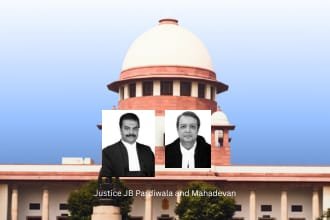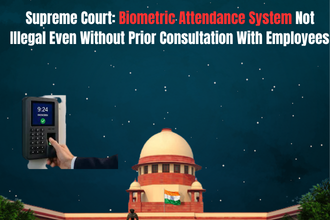In a landmark judgment that seeks to uphold the federal spirit of the Constitution and limit arbitrary executive discretion, the Supreme Court of India has redefined the contours of Presidential powers under Article 201 of the Constitution. Delivered in The State of Tamil Nadu v The Governor of Tamil Nadu and Anr, this April 8, 2025 judgment by Justices JB Pardiwala and R Mahadevan has far-reaching implications on the relationship between the Union and State governments.
Background: Article 200 and 201 – A Primer
Under Article 200, when a bill is passed by a State legislature, the Governor may grant assent, withhold it, or reserve it for the consideration of the President. When such a bill is reserved, Article 201 comes into play. The President then has the option to either assent to the bill or withhold assent. The provision also allows the President to return the bill (if it’s not a Money Bill) for reconsideration by the State legislature.
Until now, there was legal ambiguity around how long the President could take to act and whether the President’s discretion was judicially reviewable. This ruling offers clarity and significantly curtails arbitrary withholding of assent.
President’s Decisions Under Article 201 Are Not Absolute
A key takeaway from the judgment is that the President of India does not enjoy an absolute or pocket veto under Article 201. The Court unequivocally stated that the President must take a decision within three months from the date of receipt of a bill reserved for his consideration. If this timeline is not adhered to, the President must provide written reasons justifying the delay.
This puts an end to the erstwhile practice of indefinite delay—often seen as a “pocket veto”—which has led to legislative stagnation in several States. Importantly, this ensures that a duly elected State legislature’s democratic will is not held hostage indefinitely.
Piecemeal Exercise of Power Under Article 201 Disallowed
The Court also addressed the issue of the proviso to Article 201, which allows the President to return a bill for reconsideration. It ruled that this should not be exercised in a piecemeal fashion. Once a bill is returned and reconsidered by the State legislature, the President must take a final call—either granting or withholding assent—with clearly articulated reasons.
This eliminates the possibility of an endless loop of reconsideration between the State legislature and the Union executive and reinforces legislative certainty.
President’s Actions Subject to Judicial Review
One of the most significant aspects of the judgment is the Court’s declaration that the President’s decision under Article 201 is amenable to judicial review. This strikes a critical balance between the separation of powers and the rule of law.
The Court outlined a two-fold test for reviewing such decisions:
- Where Union primacy exists (such as national policy concerns), judicial review would be limited to examining whether the decision is arbitrary, malafide, or legally untenable.
- Where State primacy is established, particularly if the Governor’s act of reservation contradicts the advice of the State Cabinet, courts can go deeper into assessing the legality and validity of the President’s withholding of assent.
This nuanced approach preserves the Union’s authority in matters of national importance while safeguarding State autonomy in areas where they hold constitutional primacy.
President Cannot Decide Constitutionality – That’s the Judiciary’s Domain
Crucially, the Court held that questions of constitutionality are to be resolved solely by the judiciary, not the President or executive. If a bill is reserved on grounds of possible unconstitutionality, the correct course of action is to seek an advisory opinion from the Supreme Court under Article 143 of the Constitution.
The Bench was clear: “The hands of the executive are tied when engaging with purely legal issues in a bill… only the constitutional courts have the prerogative to study and provide recommendations as regards the constitutionality of a bill.”
This ensures that executive decisions do not usurp the judiciary’s role in interpreting the Constitution and upholds the integrity of judicial review.
Reasons Must Be Detailed and Justified
Whether in the first or second round of assent, if the President withholds assent, detailed reasons must be recorded. This requirement introduces a much-needed element of transparency and accountability in the legislative process.
The Court emphasized that in cases involving potential repugnancy with central laws or issues requiring uniform national policy, the President must assess the desirability of uniformity, but even then, the reasons for rejecting a State bill must be cogent, well-documented, and defensible.
Strengthening Federalism and Cooperative Governance
This judgment is a resounding affirmation of Indian federalism. It addresses the increasing concern that the office of the Governor and, by extension, the President, was being used to politically stymie elected State governments, especially in opposition-ruled States.
By limiting discretion, insisting on time-bound decisions, requiring recorded reasons, and subjecting decisions to judicial review, the Supreme Court has fortified the balance of power between the Centre and the States.
Implications Going Forward
- For State Legislatures: They now have greater clarity and recourse if their bills are unduly delayed or rejected without explanation.
- For the Union Executive: There is a need to act within constitutional limits and provide rational justifications.
- For the Judiciary: It reinforces the principle that ultimate questions of constitutionality lie within the courts’ domain.
Conclusion
The Supreme Court’s judgment in The State of Tamil Nadu v The Governor of Tamil Nadu and Anr marks a watershed moment in the evolution of Indian constitutional law. By drawing clear boundaries around the President’s powers under Article 201, the Court has safeguarded both democratic legitimacy and constitutional propriety.
In times when federal tensions are high, and the misuse of constitutional offices is frequently alleged, this decision comes as a timely intervention—a judicial checkpoint to uphold the spirit of the Constitution.



